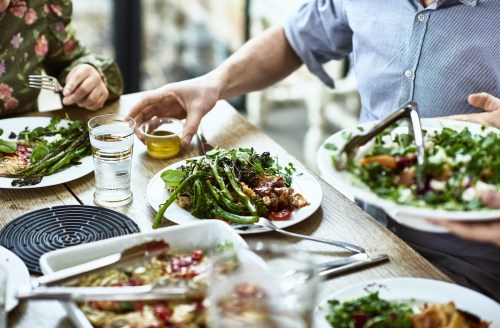Understatement of the year: Dating is tough. Are you a Capricorn and they’re an Aries? Do you actually like their friends? Does their sense of humor mesh with your own? It’s already challenging enough to merge two lives… and adding completely opposite eating habits into the mix might be a recipe for disaster.
Or is it? “Dating these days is so much harder because things like going out for too many drinks or going to fast-casual, not-so-healthy places, especially at the beginning of a relationship, are the norm,” says Carolyn Brown, MS, RD, at Foodtrainers. “And people are trying out many different diets these days, from paleo to vegan—there’s an awareness that they didn’t have before. It’s part of the new dating landscape.”
“People attach a lot of emotion and a lot of their identity to food,” adds Abby Langer, RD. “So if someone does decide to label themselves as paleo or vegan or whatever it may be, it really becomes a part of that person’s identity.” And thus an important part of your relationship together, too.
While it might seem like your relationship is doomed to fail because you guys just can’t agree on where to go for dinner, the experts insist that there’s totally a way to date and be happy together, even if you don’t follow the same diet. Experts want you to remember a few things when you’re experiencing the dietary version of Romeo and Juliet.
1. Make some compromises with your partner.
No, you won’t always be able to share meals together (especially if your eating plan is the polar opposite of your partner’s), but you both should still find flexibility to bend the rules where possible. For example, if you love to eat first thing in the morning, but your partner is big into intermittent fasting and doesn’t eat breakfast before noon, Brown believes that making some exceptions for the person you’re with is necessary for a relationship to last.
“Do brunch at 11 a.m. on the weekends and eat something small when you wake up to get you through,” she says. “If it makes no difference to your life in a big way to cater to the person you’re with—trying a vegan restaurant, for example—you owe it to your relationship to do that.” Bonus: Your partner will feel appreciated and understood, which will earn you major brownie points!
Similarly, if you want to enjoy a meal together with your partner (and your diet isn’t for medical or religious reasons), consider making an exception once a month or so. “This isn’t to say that you’re not sticking to your diet, but for instance, if you’re paleo, you can grab some pasta or sushi with your significant other sometimes,” says Brown. “You can always control the kinds of carbs you’re consuming, for instance, and it’ll make your partner feel good.”
2. Don’t force changes.
Being supportive is one thing, and changing your diet to fit your partner’s is another. “Don’t feel like you have to change your diet for someone else,” says Langer. “It’s unfair for the other person to ask, because it can extend to not supporting them.” So it’s one thing to help cook a low-carb dinner for your partner who’s in the midst of keto, but that doesn’t mean you should feel pressure to eat keto as well. Similarly, you might really want your partner to also ditch meat, but it’s unfair to ask that of them. “It really is a form of disrespect,” Langer says.
3. Try to cook together a couple of times a week.
“Cooking is a really underrated way to get closer to someone you’re dating,” says Brown. “Finding recipes that satisfy both of your restrictions, making different side dishes that cater to each of you, and playing around with new flavors is a really fun way to bond, beyond just drinking and going out. That’s the romance part!”
From researching recipes together to picking out ingredients at the grocery store to actually playing in the kitchen with flavors and seasonings, cooking together is a bonding experience that doesn’t just focus on the end result of the food, but actually looks at the entire process surrounding how it’s made. It’s a super fun way to enjoy food together, without stressing over where to go.
4. Show your support.
Maybe you’ve been together for years and you still can’t wrap your head around their veganism. That doesn’t mean you can’t support them in the life choices that they’ve made for themselves. “There are so many ways to be supportive without adopting the diet yourself!” says Langer. “For instance, if your partner is dairy or gluten-free, bring them a dairy or gluten-free cupcake on your way home from work if you see one.” And honestly, maybe even get one for yourself—you might be surprised to realize it tastes pretty damn good.
“Don’t criticize, no matter what you do,” says Langer. “Nobody wants to hear that when they’re trying to make healthier decisions for themselves.”
Remember: You love this person for who they are, not what they eat. “You really need to be open to trying new things when you’re dating someone new,” says Brown. “It’s how you learn about a person, their likes and dislikes. It’s always a red flag to me if someone isn’t being understanding or trying to meet their significant other halfway, no matter the circumstances.” Even with a partner you’ve been with for a long time, if they’ve suddenly changed their diet, keep an open mind about what they’re doing and why. Your relationship will likely be stronger for it.
Looking for a place to eat on your next date night? There are a surprising amount of keto, paleo, and Mediterranean diet options at Red Lobster and Olive Garden.
Sign Up for Our Daily Newsletter
Get all the latest in wellness, trends, food, fitness, beauty, and more delivered right to your inbox.
Got it, you've been added to our email list.











